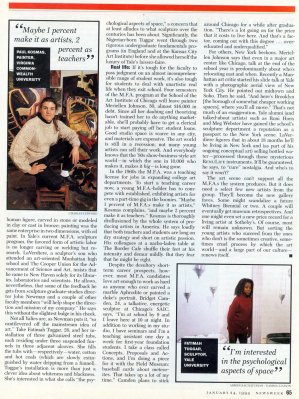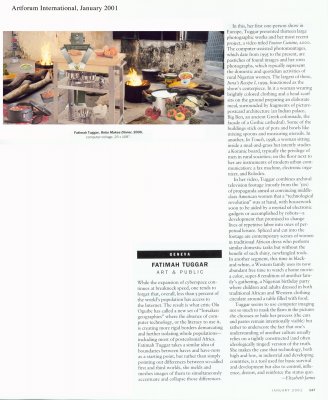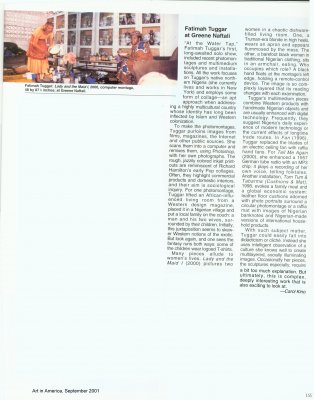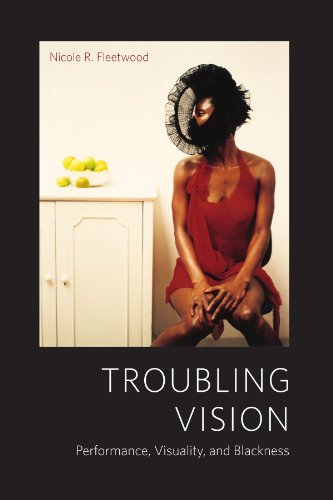
Media
Fatimah Tuggar - Digital Art Retrospective
This interview takes place at a retrospective exhibition which covers 16 years of Fatimah Tuggar's digital art. She shares her inspiration and some technical things, too. Note that Tuggar does not currently have a website, but a Google search should result in some images for you. Websites Referenced: http://www.greenhillcenter.org http://www.artistchronicle.com

School is Out, Far Out
Newsweek, January 24, 1994Print
URL: http://www.newsweek.com/school-out-far-out-187398
Peter Plagens: The world of the Master of Fine Arts degree, from which the next crop of significant American artists will come.

Fatimah Tuggar
Artforum International, January 1, 2001Print
URL: https://www.questia.com/magazine/1G1-75577272/fatimah-tuggar
Elizabeth Janus: Review of Solo Exhibition in Geneva, Switzerland on Technological boundaries between haves and have-nots.

“Fatimah Tuggar at Greene Nafaali
Art in America, September 1, 2001Print
Carol Kino: Long awaited solo exhibition, with photomontage, multimedia sculptures and installation, an apt way of addressing highly multicultural contexts.
University Of Chicago Press
226253031
Troubling Vision addresses American culture’s fixation on black visibility, exploring how blackness is persistently seen as a problem in public culture and even in black scholarship that challenges racist discourse. Through trenchant analysis, Nicole R. Fleetwood reorients the problem of black visibility by turning attention to what it means to see blackness and to the performative codes that reinforce, resignify, and disrupt its meaning. Working across visual theory and performance studies, Fleetwood asks, How is the black body visualized as both familiar and disruptive? How might we investigate the black body as a troubling presence to the scopic regimes that define it as such? How is value assessed based on visible blackness?Fleetwood documents multiple forms of engagement with the visual, even as she meticulously underscores how the terms of engagement change in various performative contexts. Examining a range of practices from the documentary photography of Charles “Teenie” Harris to the “excess flesh” performances of black female artists and pop stars to the media art of Fatimah Tuggar to the iconicity of Michael Jackson, Fleetwood reveals and reconfigures the mechanics, codes, and metaphors of blackness in visual culture.“Troubling Vision is a path-breaking book that examines the problem of seeing blackness—the simultaneous hyper-visibility and invisibility of African Americans—in US visual culture in the last half century. Weaving together critical modes and methodologies from performance studies, art history, critical race studies, visual culture analysis, and gender theory, Fleetwood expands Du Bois’s idea of double vision into a broad questioning of whether ‘representation itself will resolve the problem of the black body in the field of vision.’ With skilled attention to historical contexts, documentary practices, and media forms, she takes up the works of a broad variety of cultural producers, from photographers and playwrights to musicians and visual artists and examines black spectatorship as well as black spectacle. In chapters on the trope of ‘non-iconicity’ in the photographs of Charles (Teenie) Harris, the ‘visible seams’ in the digital images of the artist Fatimah Tuggar, and a coda on the un-dead Michael Jackson, Fleetwood's close analyses soar. Troubling Vision is a beautifully written, original, and important addition to the field of American Studies.”—Announcement of the American Studies Association for the 2012 Lora Romero First Book Publication Prize

72 Assignments: The Foundation Course in Art and Design Today, A Practical Source Book for Teachers 2013 Students, & Anyone Curious to Try
by Edited By Chloé Briggs
Paris College of Art Press, France
9782954680408
Contributed to image-making section of book with “Semiotics: A Visual Exploration of Signifiers, Meaning, Processes & Materials”
Biography
Born in Kaduna, Nigeria Raised in Nigeria and United Kingdom, Fatimah Tuggar is a multidisciplinary artist who uses technology as both medium and subject in her work to serve as metaphors for power dynamics. She combines, objects, images, and sounds from diverse cultures, geographies, and histories to comment on how media and technology diversely impacts local and global realities. Tuggar’s work has been widely exhibited at international venues, in over twenty-five countries, including the Museum of Modern Art, New York, US; Museum Kunst-Palast, Dusseldorf, Germany; Centre Georges Pompidou, Paris, France; the 24th Biennial of Graphic Art, Ljubljana Slovenia; and Moscow, Istanbul, Kwangju and Bamako Biennials. Her works have been the subject of various panels and articles. Her body of work has also been integrated as parts of academic curricula, in diverse disciplines and discussions, including technology, new media, politics, cultural studies, feminism, diaspora, globalization, anthropology, sculpture, photography, and video among others. Tuggar’s art education covers three continents and a broader range of disciplines, traditions, processes, and materials. She attended the Blackheath School of Art in London, England, received a Bachelor of Fine Arts from the Kansas City Art Institute, a Master of Fine Arts from Yale University and conducted postgraduate independent study at the Whitney Museum of American Art. She is currently an Assistant Professor of Contemporary Issues of Representation at OCAD University in Toronto. Tuggar is the recipient of prestigious accolades, such as the Civitella Ranieri Fellowship; the W. A. Mellon Research Fellowship, awarded by the John Hope Franklin Humanities Institute; and has produced commissioned works for several art institutions including Tempo Exhibition, Museum of Mordern Art, New York; In Space (Web Art) Grant, Art Production Fund, New York; Nordic Institute of Contemporary Art, Copenhagen, Denmark; Special Commission, The Bronx Museum of the Arts, New York, and In the Public Realm, Public Art Fund, New York.

